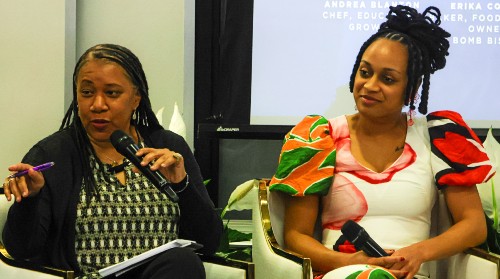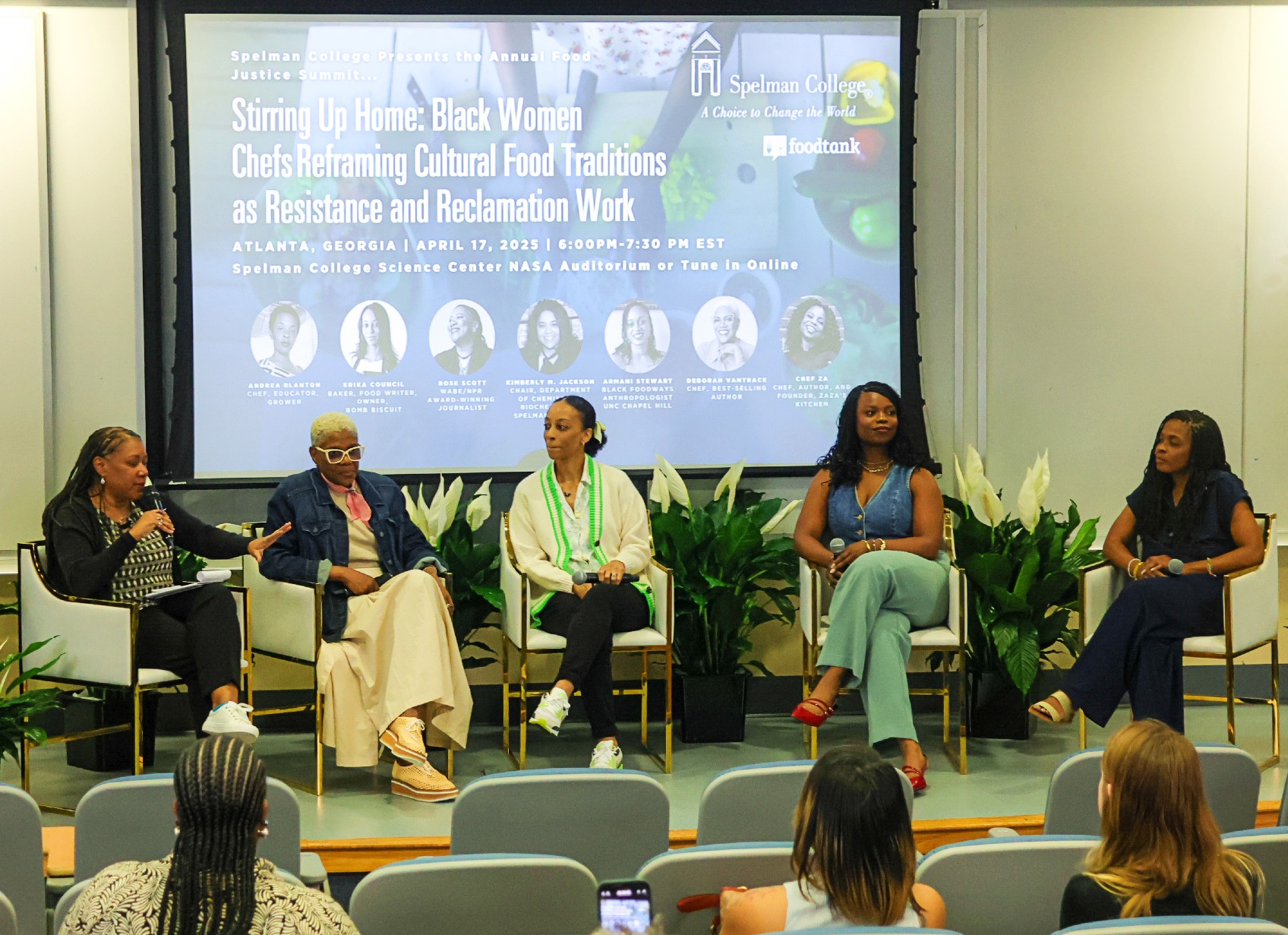Spelman's Food Justice Summit Focuses on Black Women Chefs and Cultural Reclamation
Stirring Up Change and Celebrating the Role of Black Women in Reclaiming Food Culture
 Spelman College’s annual Food Justice Summit, held this spring, was a powerful gathering of voices and perspectives exploring the transformative role of food in cultural preservation, healing and resistance. The event “Stirring up Home: Black Women Chefs Reframing Cultural Food Traditions as Resistance and Reclamation Work,” co-hosted by Spelman’s Food Studies Program and Food Tank, emphasized how Black women are boldly reshaping food systems while reclaiming their heritage and ancestral foodways.
Spelman College’s annual Food Justice Summit, held this spring, was a powerful gathering of voices and perspectives exploring the transformative role of food in cultural preservation, healing and resistance. The event “Stirring up Home: Black Women Chefs Reframing Cultural Food Traditions as Resistance and Reclamation Work,” co-hosted by Spelman’s Food Studies Program and Food Tank, emphasized how Black women are boldly reshaping food systems while reclaiming their heritage and ancestral foodways.Rosalind "Roz" Brewer, C'84, interim president of Spelman College, welcomed the gathering with a message of solidarity and vision, noting the profound significance of Black women reclaiming their cultural food practices. Her remarks underscored Spelman’s commitment to fostering a sense of home and heritage through food justice education. Rose Scott, executive producer and host of the midday news program "Closer Look" broadcast on Atlanta's NPR station, 90.1 FM – WABE, moderated the evening which featured a series of powerful talks from celebrated chefs, scholars and food advocates. Each of the panelists engaged in-person and online participants by sharing personal stories and professional insights that underlined the sacred, ancestral and healing qualities of food.
-
Kimberly M. Jackson, Ph.D., chair chemistry and biochemistry, and director of the food studies program at Spelman, welcomed attendees by reflecting on food as life, medicine and a great connector. Dr. Jackson described food as not only essential for sustenance but also as a means of bonding, a sacred practice, and a tool for resistance and reclamation. She emphasized the importance of food as a medium for sharing love, healing and history. Through a video, participants learned that the food studies program is more than an academic exercise, it’s transdisciplinary movement that has touched thousands of people to date and still counting.
-
Armani Stewart, a New Orleans native, plant-based baker, writer and sociocultural food anthropologist, shared her journey of healing through food. With training in Africana Studies, Stewart is also a cultural food and holistic wellness advocate, focusing on Black plant-based food traditions, culinary care work, and the cultural politics of nutrition. Her research centers on the lived experiences and wellness expertise of Black women, as she works to reclaim health and reframe food narratives surrounding their lives. Stewart’s work is particularly passionate about the cultural preservation and elevation of Black women’s culinary expertise in the American South.
Reflecting on her personal journey after being diagnosed with endometriosis in 2019, she shared how embracing plant-based diets led to healing and comfort.“I see research as healing,” Stewart stated. Her work in this field is about more than just food—it is about empowering Black women through their culinary traditions, highlighting the ancestral knowledge that has long sustained their health and communities. For Stewart, food is not just a diet but a powerful lifestyle that honors both heritage and health. She is deeply committed to using her platform to uplift Black plant-based food practices and elevate the voices of women who have historically been overlooked in broader food justice conversations.
-
Chef Andrea Blanton, C'2006, an educator, grower and Spelman alumna, shared her story of food as resistance. Blanton reflected on the political power of cooking, noting that what we eat and how we prepare food is deeply political. For Blanton, food connects communities and mobilizes them for social change. She also touched on the importance of reclaiming food traditions, particularly within Black communities, to resist harmful narratives and stereotypes about traditional soul food. "Food has always brought me continuous knowledge," she remarked. Blanton is the owner of Food Earth Birth, a company rooted in earth-based services that include seasonal catering, herbal tea ceremonies, and natural birth work. Through this company, she centers environmental sustainability and the local economy. She has also created and implemented STEM garden camps in collaboration with local elementary schools, impacting over 120 students annually. Her partnership with organizations like Families First and H.A.B.E.S.H.A. to provide holistic birth and nutrition services further underscores her commitment to community empowerment and health education.
-
Chef Erika Council, James Beard nominated chef and owner of Atlanta's Bomb Biscuits, connected the dots between Southern food and community activism. Known for her work as a baker and food writer, Council spoke about how food traditions can be a source of both empowerment and resistance. She highlighted the role of Black women chefs in reimagining Southern foodways, ensuring that these traditions remain rooted in community, culture, and resistance. Council has a strong literary and culinary lineage. It's her maternal grandmother Geraldine Dortch, an educator with an advanced degree from Columbia University, whose love for biscuits inspired Council’s own culinary path. It was Dortch who gave Council Cleora Butler’s cookbook, “Cleora’s Kitchens: The Memoir of a Cook and Eight Decades of Great American Food,” and it was Dortch who ate the first biscuits Council ever baked — an effort that almost burned down the kitchen.
Council, who recalled how terrible her first batch of biscuits were with a smile, is also the author of “Still We Rise: A Love Letter to the Southern Biscuit with Over 70 Sweet and Savory Recipes,” where she shares her passion for biscuits and their rich cultural history. When speaking of her love for biscuits she says fondly, "They're the longest enduring relationship I've ever had." "They've never failed me, never treated me badly ... they're comforting in my time of need, anything you'd ever want in a partner."
-
Chef Deborah VanTrece, the award-winning chef, best-selling author creative director and owner of Atlanta's Twisted Soul Cookhouse & Pours and Oretha’s at the Point, spoke about the importance of joy in cooking. She highlighted the significance of food as an act of reclamation, noting that cooking with joy and intention can transform spaces and communities. VanTrece also emphasized that what we eat is inherently connected to who we are and how we resist systems that seek to undermine our cultural identity. “What we do is political,” she declared.
“The food we grew up eating is not as negative as we were led to believe. Food connects. It’s amazing the change we can make. We’ve all we’ve got!” She also shared her personal experiences, such as starting a collection for a Black-owned restaurant in Los Angeles after it was destroyed in a fire, highlighting how food can rally communities in times of need. VanTrece concluded, “Charging what I charge is an act of resistance,” emphasizing the power of economic self-determination in the food industry.
-
Nzali Scales, C’2019, affectionately known as Chef Za and owner of ZaZa's Kitchen, brought attention to the need for joy in food spaces, stating, “I teach kids how to cook as a sustaining practice.” Za translated her love for cooking into a business by founding Zaza’s Kitchen in 2018 as a food blog and meal prep service. After graduating from Spelman College, she pursued a doctoral program in Sociology at Northwestern University, where she researched how to address food-related health disparities in Black and Brown communities. Although her research gave her a fundamental understanding of food injustice, Chef Za felt that her platform with Zaza's Kitchen offered a more direct solution. In 2020, she pivoted from student to full-time chef and entrepreneur. Chef Za holds a Bachelor of Arts in Sociology from Spelman College, a Food and Nutrition Teacher’s Certificate from Columbia University, and a Health Coaching Certificate from the Integrative Institute of Nutrition.
Scales also studied Italian regional cuisine under the guidance of Master Chef John Nocinta, deepening her knowledge of traditional culinary techniques, regional ingredient sourcing, and seasonal preparations. Chef Za emphasized the importance of food as a source of empowerment, joy and community. “We’re reclaiming our relationship with food,” she said, reinforcing the notion that food is not just about nourishment, but also about connection, culture and resistance.
Throughout the evening, participants enjoyed the stories of culinary resilience and reclaiming foodways as acts of resistance. Whether through Chef Za’s curations of joy-filled spaces or Armani Stewart’s research into plant-based diets as healing, the speakers emphasized that food is more than sustenance — it is a reflection of history, culture, and resistance. For many, the Summit was a reminder that "we trust you" — we trust the power of food to heal, to empower and to restore.

Celebrating Food as a Holistic Experience
Spelman's Food Justice Summit also focused on how food intersects with larger societal movements and promotes a holistic approach to health and wellness. The conversation expanded beyond food systems to examine the “inner foodways” of women, describing the ways food shapes intimate and life-sustaining practices.
Queen Afua, a noted health practitioner and author, was mentioned by several speakers, including Stewart, who highlighted Afua’s work in promoting wellness through plant-based lifestyles. The idea of food as more than just nutrition — highlighting its connection to emotional, spiritual, and cultural health — was a central theme.
The evening was filled with reflection on how food is not only an expression of cultural heritage but also a means of challenging the status quo, building community, and healing. As Chef Blanton remarked, “Food was an introduction to mobilizing,” demonstrating the power of food as a catalyst for change. Attendees left with a deeper understanding of how food connects us to our past, empowers us in the present, and transforms our future. Through the wisdom and experiences shared by the chefs and scholars, the event underscored the role of Black women in reshaping food systems and reclaiming culinary traditions as acts of resistance and empowerment.
